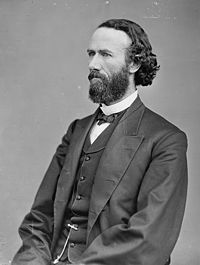John B. Henderson
| John B. Henderson | |
|---|---|
 |
|
|
United States Senator from Missouri |
|
|
In office January 17, 1862 – March 4, 1869 |
|
| Preceded by | Trusten Polk |
| Succeeded by | Carl Schurz |
| Member of the Missouri Senate | |
|
In office 1848–1850 1856–1858 |
|
| Personal details | |
| Born |
John Brooks Henderson November 16, 1826 Danville, Virginia |
| Died | April 12, 1913 (aged 86) Washington, D.C. |
| Political party | Democrat, Unionist, Republican |
| Spouse(s) | Mary Foote Henderson |
| Profession | Politician, Lawyer, Teacher |
| Military service | |
| Service/branch | Missouri Militia |
| Rank | Brigadier General |
John Brooks Henderson (November 16, 1826 – April 12, 1913) was a United States Senator from Missouri and a co-author of the Thirteenth Amendment to the United States Constitution.
Born near Danville, Virginia, he moved with his parents to Lincoln County, Missouri, studied on his own while a farm hand, taught school, was admitted to the bar in 1844, and practiced.
Henderson was a member of the Missouri House of Representatives in 1848-1850 and 1856–1858, and was active in Democratic politics. He was commissioned a brigadier general in the Missouri State Militia in 1861, commanding federal forces in northeast Missouri.
On January 17, 1862 Henderson was appointed to the U.S. Senate as a Unionist to fill the vacancy caused by the expulsion of Trusten Polk. Later that year, Henderson was elected to a full six-year term in the U.S. Senate.
In 1862 Henderson signed a peace treaty with Jefferson Jones of the short-lived Kingdom of Callaway, lending that breakaway state legitimacy before federal troops invaded and ended its existence.
According to a story circulated in the early 1900s, Henderson met with President Abraham Lincoln on April 14, 1865 shortly before Lincoln left for Ford's Theatre where he was assassinated that night, and successfully procured a pardon for Missouri resident George S. E. Vaughn who had been convicted of spying and sentenced to death, becoming Lincoln's last official act as President. However in 2011 David Blanchette of the Abraham Lincoln Presidential Library and Museum in Springfield, Illinois said there is no record of any such pardon.
...
Wikipedia
